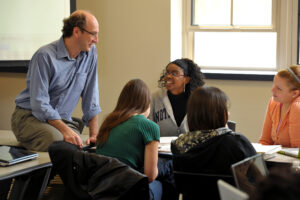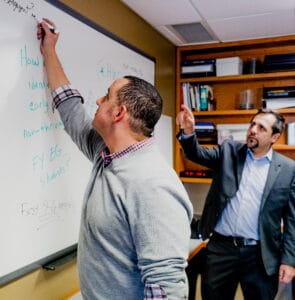Assessment
- Overview & Consultations
- University Learning Outcomes for Undergraduates
- Kaneb Center Course Design Academy
- Teaching in the Age of AI Series
- Learning Analytics Literacy Workshop Series
- More Assessment Resources and Related Workshops
- Research and NSF Grant Proposal Support
- Kaneb Center Library
- Assessment and Accreditation
1. Overview & Consultations
 When we think of how we assess student learning, our minds often go straight to grading. And to be sure, grades are probably the most universally recognized form of assessment.
When we think of how we assess student learning, our minds often go straight to grading. And to be sure, grades are probably the most universally recognized form of assessment.
But in reality, assessment comprises a large range of strategies and practices, with grading most accurately viewed as one (albeit typically quite important) tool in that process.
Barbara Walvoord, an emerita faculty member at Notre Dame and the founding director of Notre Dame Learning’s Kaneb Center for Teaching Excellence, defines assessment this way in the opening chapter of her widely influential book Assessment Clear and Simple:
“Assessment is the systematic collection of information about student learning, using the time, knowledge, expertise, and resources available, in order to inform decisions that affect student learning.”
She goes on to point out that assessment is both “a natural, scholarly act” and one that constituencies within and beyond a university, from the general public to accreditation bodies, are rightfully interested in.
We find the three steps of assessment Barbara identifies to be particularly helpful:
- Goals. What do we want students to be able to do when they complete our courses of study? (Goals may also be called “outcomes” or “objectives.”)
- Information. How well are students achieving these goals, and what factors influence their learning?
- Action. How can we use the information to improve student learning?¹
In practice at Notre Dame, we use the word “assessment” broadly, encompassing everything from how an instructor figures out whether a student is meeting a given learning goal in a class up through how the University might measure the value of a Notre Dame education.
While much of the formal policy-setting related to assessment is left to the individual colleges and schools, the resources linked below are meant to support everyone who teaches at the University and further our collective assessment practice. The Notre Dame Learning Team is also available for consultations.
2. University Learning Outcomes for Undergraduates
The University Learning Outcomes for Undergraduates are informed by Notre Dame’s Vision for Undergraduate Education, indicating what all Notre Dame undergraduates, regardless of major, should be able to do by the time they graduate. All manner of academic programs and experiences contribute to the acquisition of these competencies, but the core curriculum is especially instrumental. Administered by an academic committee composed of representatives from across campus, the core is a set of requirements that apply to every undergraduate student at the University.
3. Kaneb Center Course Design Academy
 The Kaneb Center Course Design Academy (KCCDA) is a cohort-based professional development program for Notre Dame faculty focused on using evidence-based inclusive teaching principles and strategies to design or redesign a course for Notre Dame undergraduate or graduate students. The program is open to all Notre Dame faculty regardless of rank and runs for an academic year (September–May).
The Kaneb Center Course Design Academy (KCCDA) is a cohort-based professional development program for Notre Dame faculty focused on using evidence-based inclusive teaching principles and strategies to design or redesign a course for Notre Dame undergraduate or graduate students. The program is open to all Notre Dame faculty regardless of rank and runs for an academic year (September–May).
KCCDA participants—who receive $5,000 in their discretionary account or as additional pay—attend monthly, three-hour-long working sessions focused on course design principles and practices facilitated by Kaneb Center faculty and staff. Participants also engage in peer classroom observations along with consultations with learning designers and specialists as well as trained student pedagogical consultants.
The course design/redesign process employs backward design principles, which call on instructors to first identify learning goals and how they will assess whether students have met them before tackling how they will present the course’s content.
4. Teaching in the Age of AI Series
A slate of workshops, conversations, and events, this series—much of which is focused on assessment—is designed to create a supportive community of faculty members and teaching staff and provide the knowledge, skills, and resources necessary to adapt and effectively integrate AI technologies into teaching. A companion resource guide is also available, with section 4, “Strategies for Effective Teaching in the Age of AI,” sharing new ways you might ask students to demonstrate their skills, knowledge, and abilities.
5. Learning Analytics Literacy Workshop Series
Designed to help faculty enhance their practice with learning and assessment data, the Learning Analytics Literacy Workshop Series is adapted from the Stepping Stones curriculum from Unizin, a nonprofit organization dedicated to addressing the challenges of data, analytics, and digital content in higher education.
The curriculum consists of four modules:
- Workshop 1: Designing Courses for Useful & Accessible Data
- Workshop 2: Canvas Learning Analytics for Student Engagement
- Workshop 3: Canvas Quiz Statistics & Test Item Analysis
- Workshop 4: End of Course Analytics for Action
While the series has concluded, Notre Dame Learning is looking to develop it further, including as an asynchronous offering that would confer digital badges to endorse skills related to using assessment data effectively.
6. More Assessment Resources and Related Workshops
This collection of online resources and related Kaneb Center workshops includes strategies you can use to plan and conduct assessments that both facilitate and measure student learning. Topics range from inclusive course design and how to enhance student learning with frequent, low-stakes assessments to using rubrics to assess student work, strategies for what to do after you’ve graded the test, and the Scholarship of Teaching and Learning, or SoTL.
Depending on the time of year and faculty demand for our services, most of the workshops can be delivered for individual departments upon request. That said, the materials associated with each workshop are always available through our website and serve as valuable reference tools. (Note that some do require a Notre Dame NetID and password to access).
7. Research and NSF Grant Proposal Support
 The Notre Dame Learning Analytics Working Group provides support for NSF grant proposals related to assessment and evaluation. We offer assistance with research design, data collection, and umbrella IRB, enabling teaching faculty to engage as scholar-practitioners in the Scholarship of Teaching and Learning (SoTL). We also conduct workshops on “Improve your Teaching & Student Learning with Classroom Research” and “Design, Study, Publish: Scholarship of Teaching and Learning.”
The Notre Dame Learning Analytics Working Group provides support for NSF grant proposals related to assessment and evaluation. We offer assistance with research design, data collection, and umbrella IRB, enabling teaching faculty to engage as scholar-practitioners in the Scholarship of Teaching and Learning (SoTL). We also conduct workshops on “Improve your Teaching & Student Learning with Classroom Research” and “Design, Study, Publish: Scholarship of Teaching and Learning.”
For more information, contact Alex Ambrose, program director of assessment and analytics at the Kaneb Center.
8. Kaneb Center Library
The Kaneb Center’s library, located in 353 Debartolo Hall, houses hundreds of books and periodicals on a variety of topics related to teaching and learning in higher education, including assessment.
To borrow an item, visit us or send an email request to kaneb@nd.edu.
9. Assessment and Accreditation
Notre Dame’s institutional accrediting body, the Higher Learning Commission (HLC), articulates five criteria for accreditation. Criterion 4 is dedicated to the evaluation and improvement of teaching and learning and specifies the standards HLC expects its accredited schools to meet with regard to assessment:
4.B. The institution engages in ongoing assessment of student learning as part of its commitment to the educational outcomes of its students.
- The institution has effective processes for assessment of student learning and for achievement of learning goals in academic and cocurricular offerings.
- The institution uses the information gained from assessment to improve student learning.
- The institution’s processes and methodologies to assess student learning reflect good practice, including the substantial participation of faculty, instructional and other relevant staff members.²
¹Walvoord, Barbara. Assessment Clear and Simple: A Practical Guide for Institutions, Departments, and General Education, 2nd Edition. John Wiley and Sons, 2010.
² https://www.hlcommission.org/Policies/criteria-and-core-components.html